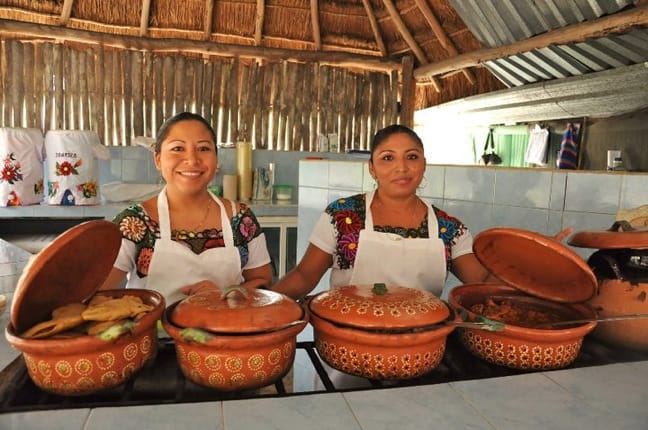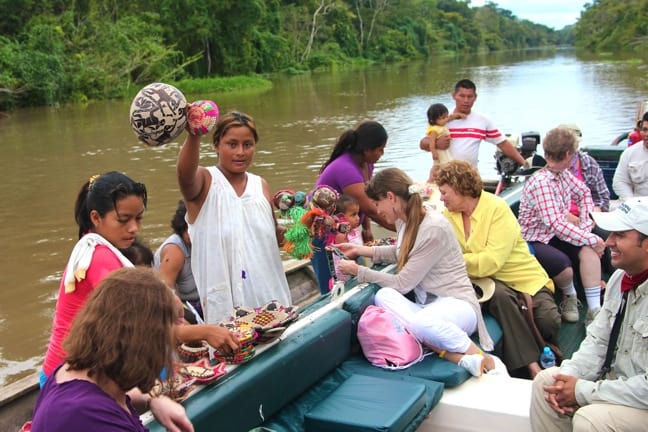When we travel to new places, supporting the local community should always be a consideration when planning our trip.
Getting local is how we foster a community of welcoming hosts, and it’s also a way for destinations to ensure they remain unique and special.
Respectful visitors want to boost the local economy, celebrate local traditions, and aid in local efforts.
We love participating in the communities we find ourselves in, even if only for a short time,. In our experience, it’s one of travel’s greatest pleasures.
Our tourist dollars often play a huge role in helping to preserve natural wonders, maintain historic architecture, develop new attractions, and pay residents’ salaries.
Our thoughtful spending choices are how exciting destinations remain intact for future travelers.
That local ambiance is what makes each travel experience rich and real for us as travelers, so our efforts to get local as tourists both enhance the local community and our own experience.
The best way to do these things is to make simple but thoughtful travel choices. Read on for 7 simple ways to support local communities when you travel!
READ MORE: 15 Reasons Responsible Tourism Is Better for Everyone


1. Buy From Locally Owned Shops
For those who like to take memorabilia and other gifts home, those souvenirs should ideally come from locally owned shops.
It’s also a good idea to stick to locally produced (authentic) items crafted by local artisans. That way, whatever comes home with you is a true piece of the place you’ve visited.
This same idea also holds true for tour companies and hotels.
Rather than booking with international agencies that bring in outside staff, look for companies owned by locals, which utilize local workers. Find B&Bs run by enterprising residents.
But typical tourist stuff is definitely not all we buy when we travel. Making use of local farmers markets and grocery stores makes a huge impact on the local economy, too!
READ MORE: What Is Ecotourism? (History & Principles of Responsible Travel)


2. Dine at locally owned restaurants
Nothing provides a look into culture quite like food. And from Philadelphia to the Philippines, locally owned restaurants are vying to share the best version of what’s cooking.
Forget about eating like you do back home. Instead, try to discover the new flavors that make up a place’s traditional cuisine.
Of course, visiting locally owned restaurants is great for the local community as well. It feeds the economy and keeps those small businesses afloat.
All the while, these restaurants are providing jobs for locals, and independent restaurants are providing unique experiences for guests.
Be sure to find out traditional food and fusion dishes to try while in town. It’ll always provide an important piece of the place’s personality!
READ MORE: Importance of Community Tourism in Responsible Travel


3. Learn About/Observe Local Customs
Appreciating local customs like traditional food will enhance our visits and give the community a chance to show what’s important to them. But traditions don’t just involve the dinner table.
Learning about customs may involve visiting ruins, exploring history museums, and checking out the old religious buildings.
Our interest means meaningful work for local experts, and creates quality memories for us.
Observing local customs is also a great idea for impressing hosts with knowledge and honest curiosity about their home and history.
READ MORE: 40 Green Travel Tips (The Ultimate Guide to Sustainable Travel)


4. Embrace Local Culture
Learning about traditional customs reveals the history of a country and its communities, but obviously life goes on.
Embracing the local culture as it is today leads to shared experiences of places with the people who populate them. As they say, when in Rome…
Cultural festivals and community events allow visitors an opportunity to deep dive into local life, exploring everything from food and music to games and storytelling.
Watching demonstrations or taking classes for crafting, cooking, and communicating also help. These are the things that make a place come to life!
As with all things local, the more tourists take an interest in the reality of a place and its people, the better for the visitor and their hosts alike.
READ MORE: Maasai Mara Conservancies: Community-Based Conservation


5. Use basic local lingo
A huge part of getting into the culture and getting around in a new place is to use some basic local lingo.
Knowing how to say “please,” “thank you,” and “hello” is a fine start, but you can dig deeper. It’s amazing how much an attempt to use a language means to locals!
Many places have unique, commonly used phrases that are helpful to understand and pick up the general vibe.
A great example of this is Costa Rica’s “pura vida,” which literally translates to “pure life,” but is also used as a greeting.
Most of us aren’t going to be anywhere close to fluency in a foreign country. But having some rudimentary language skills goes a long way towards establishing personal connections.
READ MORE: How Overtourism is Destroying Destinations


6. Engage With Local People
For those who aren’t conversational in the language of the place we’re visiting, getting a quality universal translator can help us engage with local people more deeply.
We can quickly get to the basics of family, work, and interests when getting to know someone. Likewise, they can find out more about us.
Some voice translators, like the Vasco Translator V4, allow users to speak in over 75 languages and translate text in even more languages.
The V4 translates in less than a second, and has a photo translate feature that can also decipher photos of street signs, menus, brochures, etc.
The more it’s used, the more comfortable users become with the local language. And the more control of the language we visitors have, the easier it is for locals to engage with us.
READ MORE: 12 Odd Intangible Cultural Heritage Practices UNESCO Protects


7. Support Local Causes
From the richest countries to the least developed, there are important causes to support everywhere in the world.
They can be focused on helping people, protecting the local animals, or preserving historic areas.
While giving money to charities is a rewarding option for supporting local causes, there are also other, more tourist-focused ways of doing it.
Many travel agencies are embedded in local causes, as are local businesses. It’s our duty to choose these types of places to fulfill our travel needs.
In other words, we can go on a small, NGO-affiliated whale-watching tour as opposed to others, which often help to fund local conservation efforts.
These causes obviously teach us a lot about the places we’re visiting, and our knowledge and support will help the local community in their efforts. -by Jonathon Engels; all photos by Bret Love & Mary Gabbett







